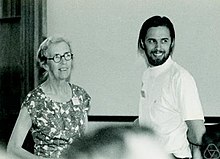Charles C. Pugh | |
|---|---|
 Charles Pugh, Berkeley, 1993 | |
| Born | June 16, 1940 United States |
| Alma mater | Johns Hopkins University (PhD) |
| Known for | Work in dynamical systems |
| Scientific career | |
| Fields | Mathematics |
| Institutions | University of California, Berkeley |
| Thesis | The Closing Lemma for Dimensions Two and Three (1965) |
| Doctoral advisor | Philip Hartman |
| Doctoral students | |
| Website | https://math.berkeley.edu/people/faculty/charles-c-pugh |
Charles Chapman Pugh (born June 16, 1940) is an American mathematician who researches dynamical systems. Pugh received his PhD under Philip Hartman of Johns Hopkins University in 1965, with the dissertation The Closing Lemma for Dimensions Two and Three.[1] He has since been a professor, now emeritus, at the University of California, Berkeley.
In 1967 he published a closing lemma named after him in the theory of dynamical systems.[2][3] The lemma states: Let f be a diffeomorphism of a compact manifold with a nonwandering point x.[4] Then there is (in the space of diffeomorphisms, equipped with the topology) in a neighborhood of f a diffeomorphism g for which x is a periodic point. That is, by a small perturbation of the original dynamical system, a system with periodic trajectory can be generated.
In 1970 he was an invited speaker at the International Congress of Mathematicians in Nice, delivering a talk on Invariant Manifolds.

- ^ Charles C. Pugh at the Mathematics Genealogy Project
- ^ Bonatti, Christian (June 10, 2008). "Pugh closing lemma". Scholarpedia. 3 (6): 5072. Bibcode:2008SchpJ...3.5072B. doi:10.4249/scholarpedia.5072. ISSN 1941-6016.
- ^ Pugh, Charles C. (1967). "An Improved Closing Lemma and a General Density Theorem". American Journal of Mathematics. 89 (4): 1010–1021. doi:10.2307/2373414. ISSN 0002-9327. JSTOR 2373414.
- ^ Wandering points were introduced by George Birkhoff to describe dissipative systems (with chaotic behavior). In the case of a dynamical system given by a map f, a point wanders if it has a neighborhood U which is disjoint to all of the iterations of the map on it:

